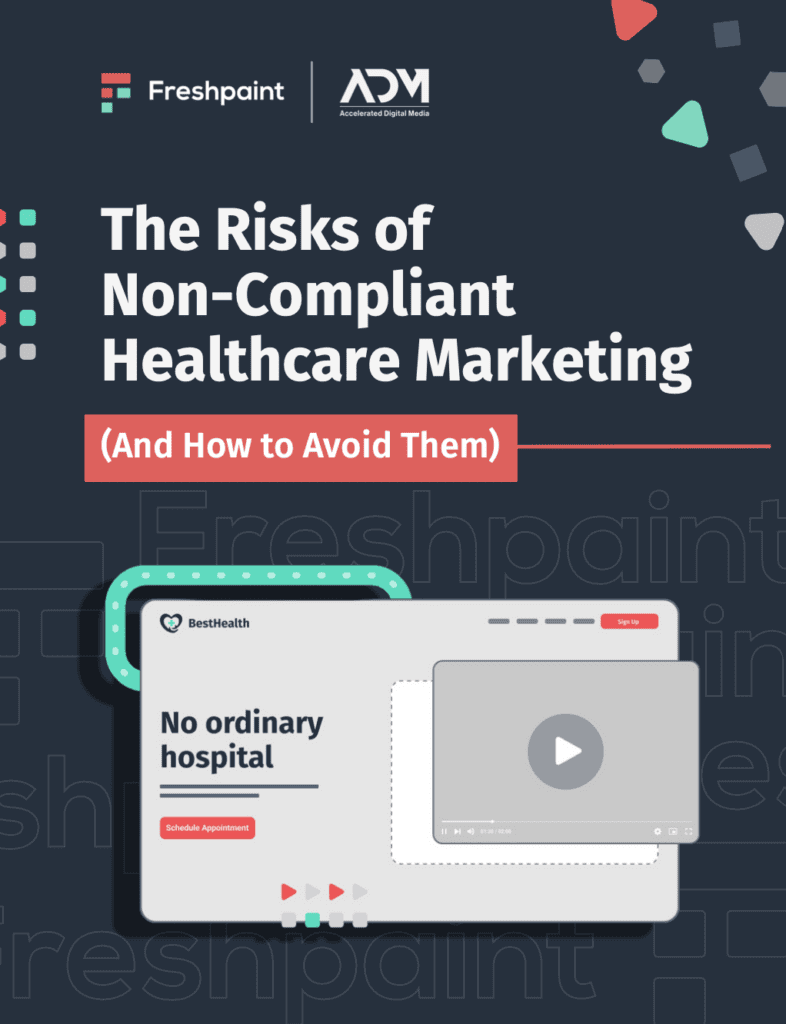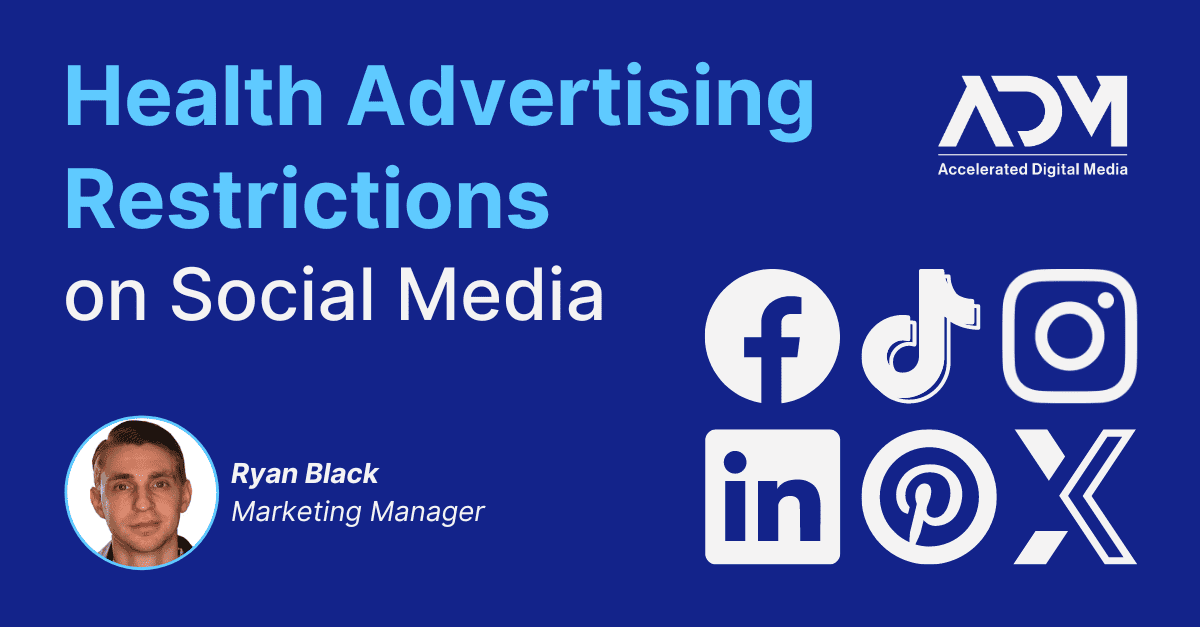- In addition to legal policies governing how health companies can advertise online, digital marketing platforms also have their own policies that must be followed for health ads to be approved
- While there is variance in what these platforms allow, there are some commonalities—like rules against misleading claims or requirements for certain certifications
- It’s vital that advertisers study the nuances of platform-specific health marketing policies
- Failure to adhere to these policies can result in ad disapproval or even account suspension
Digital marketing for health brands is a tricky pursuit. They have to adhere to serious, highly-nuanced legal restrictions that limit their ability to take advantage of many tools available to advertisers in other industries. But these brands also have to avoid running afoul of platform-specific policies that influence what they can and can’t say with their health product messaging.
Failure to follow these policies can have consequences. Brands can have their ads limited or disapproved, or even have their accounts locked, if they flaunt the policies meant to keep these social platforms safe and non-invasive for users.
To make things simpler, ADM has assembled this guide to the noteworthy health advertising policies across the leading social platforms. Recognize that these are just platform content policies and are separate from, and not based on, the federal policies regarding PHI that deny the use of tracking pixels in most health applications.
Meta (Facebook and Instagram)
Meta is the juggernaut of social media advertising. Meta Ads allows you to place across Instagram and Facebook—each with more than 2 billion monthly users—as well as other Meta properties like WhatsApp and Messenger.
Because of the sheer scope of its advertising suite, Meta has some of the most detailed health marketing content policies in the industry. As of 2024, policies restricting Facebook and Instagram health marketing include:
- Personal Health and Appearance Policy, which states that advertisers should not run ads that generate negative self-perception based on health attributes
- Cosmetic Procedures and Wellness Policy, which dictates that advertisers not target users under the age of 18 with any of these products or services
- Online Pharmacies Policy, which allows only LegitScript-certified pharmacies to advertise on Meta platforms
- Personal Attributes Policy, which forbids brands from using their ads to assert or imply personal attributes (including medical conditions).
Meta also has a prohibited information policy which discourages brands from sharing certain user information with the company, including “information about an individual’s physical or mental health” with various examples.
Meta’s policies can be updated at any time, and given the controversy involving Facebook’s role in several health data sharing cases, it’s important to stay up to date on any changes the social giant may announce throughout 2024. For a deeper understanding of how to stay compliant on Facebook and Instagram, check out our guidance: “Best Practices for Digital Health Ad Approvals on Facebook & Instagram.”
EBOOK: THE RISKS OF NON-COMPLIANT HEALTH MARKETING
This eBook examines the stakes that healthcare companies face in their digital marketing efforts and offers valuable guidance on how to run compliant advertising.

TikTok
TikTok is a surging social phenomenon, combining short form video with a rapidfire viewing experience and an impressively predictive algorithm. It’s also an increasingly-potent advertising option, even for health brands. TikTok has been quickly building out restrictions and policies governing health advertising on its platform. TikTok’s health marketing restrictions include:
- A Restricted content policy that dictates terms for advertising about weight control, COVID-19, and other relevant topics, plus advertising certain health topics to people under the age of 18
- A Prohibited Content policy which bans advertisers from collecting “information concerning health,” including “medical history, disabilities, mental or physical condition, or medical treatments.”
- Industry Policies that require health advertisers to only target users over 18 years of age and otherwise defer to “all applicable laws and regulations of the target country.”
Like Meta, TikTok explicitly asks brands not to use its tracking technology to collect healthcare information.
X (formerly Twitter)
The platform once called Twitter has experienced some advertiser flight lately, but it’s still a major player in social media marketing. Now called X, it has a large healthcare policy section that covers restrictions unique to different countries around the world. Its primary policy is actually a list of exceptions: “Unless listed below, the promotion of health and pharmaceutical products and services is prohibited,” X’s site states.
For health advertisers in the United States, some pertinent X Business policies allow:
- Telemedicine advertising, provided the brand only advertisers in states it can operate and seeks prior authorization form X
- Advertisements for brick-and-mortar pharmacies provided they don’t promote the online sale of pharmaceuticals
- Advertisements for FDA-approved medical devices
- Advertisements from NABP-accredited online pharmacies
To view the full list of restrictions, view X’s Healthcare policy page. The company also prohibits the creation of custom audiences or conversion events based off of sensitive information, including health information.
If advertisers have been leaving X, where are they going? Some believe they’re heading to LinkedIn Ads, and for good reason: It’s a highly-underrated marketing tool for brands in many industries, and ADM thinks more brands will embrace the platform in 2024. LinkedIn’s health ad policies include:
- A fairly comprehensive and consolidated Healthcare Ads Policy that outlines rules for what health products and services can be marketed on the platform, and under what conditions
- Content guidelines for health and weight loss ads, which discourage ads that promote misleading health info, “idealize or criticize” someone’s physical attributes, nor “promote or reinforce” negativity around body image or health conditions.
Pinterest is an intriguing, cost-effective, and highly-visual social platform with a devoted user base that appeals to many health and lifestyle brands. It also has some of the most straightforward and unique health advertising policies of all. For healthcare and wellness ads on Pinterest, brands may not:
- Target audiences based on sensitive health or medical conditions
- Advertise many health services, including clinical trials, direct-to-consumer genetic tests, paternity tests, and more
- Advertise about weight loss at all. Since 2021, the platform has banned all weight loss imagery and language entirely from its advertising.
With prior platform approval, and subject to certain restrictions, Pinterest does allow marketing from online pharmacies, pharmaceutical manufacturers, and telehealth providers.
Staying Compliant in Healthcare Social Marketing
It’s vital to ensure you’re up-to-date on the health advertising policies on every social platform in your brand’s digital marketing portfolio if you want to keep your account in good standing. The last thing you want are negligent ad disapprovals that slow down your growth marketing strategy. And even more importantly, stay in tune with the latest in health advertising legal news, because worse still than a locked ads account would be a seven-figure fine.
For help navigating the ins and outs of health digital marketing, it may be wise to partner with an agency that specializes in healthcare. Reach out to the ADM team today if you’re looking for compliant marketing success.




